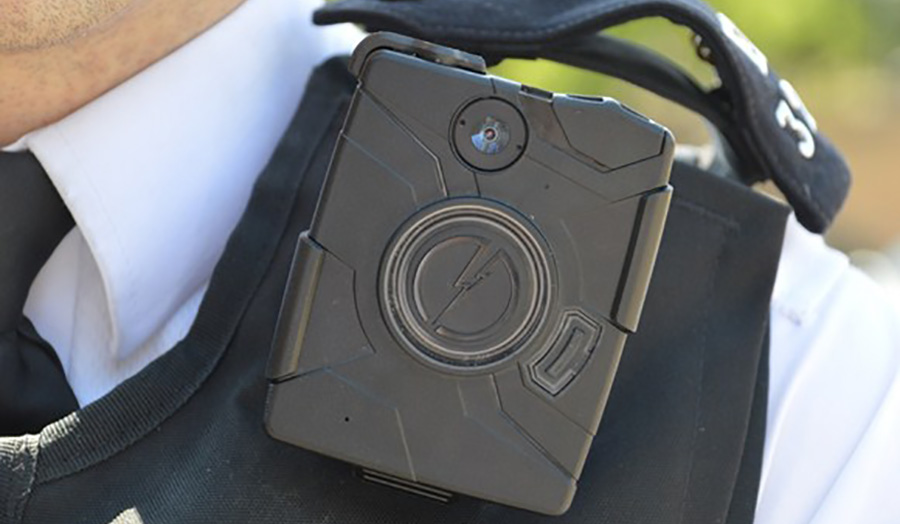Criminologists at London Metropolitan University conducted research for City of London Police.
Date: 15 August 2017
Criminology experts at London Metropolitan University have identified broad support among police officers for body worn video cameras, following a study with City of London Police
The research, published today, shows that over 80% of front-line police officers think wearing cameras should be compulsory.
The report, called ‘Trialling body worn video cameras for City of London Police
’, also shows that more than 93.2% of officers believe cameras will help with evidence gathering.
London Met was commissioned to carry out the research due to its strong expertise in policing, with the University running several courses such as BSc Criminology and Policing, MSc Security Studies, and a short course in Knowledge of Policing.
The independent study looked at officers’ attitudes towards the technology over a two year period, during body camera trials with the City of London Police.
Officers were interviewed before and after the trial to identify any shifts in attitude towards the technology.
The findings show that of the 149 police officers interviewed, 83% feel body cameras should be worn, with one adding that cameras are “the best piece of kit” they have used.
Positive views
Lead author Dr James Morgan, senior lecturer in Criminology BSc, said: “Contrary to many assumptions regarding ‘cop culture,’ the officers surveyed and interviewed for this study were very progressive in their approaches to this new technology.
“They wanted greater accountability and oversight and believed in their own policing practice and wanted this recorded.
“The findings also point to a particular context in policing, where actions are often scrutinised with members of public armed with their own recording equipment. The participants of this study wanted their own footage to counter negative portrayals of the police which might be found on social media, having their perspective and experiences better understood by the wider public.
“Police officers were mainly positive about the technology, most notably in the hope it would reduce spurious complaints and give police the opportunity to show the pressures in which they work under.”
Calming effect
Another interesting finding was that officers believe the presence of a camera has a positive and calming effect on confrontational situations.
Dr Morgan added: “As well as lowering complaints it was hoped that this technology would reduce the time officers spent preparing evidence for court, increase guilty pleas and contribute to a reduction of assaults on officers.”
Second author, Dr Dan Silverstone who now works for Liverpool John Moores University, added: “The findings are particularly important because it addresses the stereotype that police officers often face. The cameras will play a significant role in improving police legitimacy and improving public safety.
“At the time of the study, there were issues to be addressed in ensuring that the evidence from the cameras was compatible with the Crown Prosecution Service systems. However, when these are resolved, evidence from the body worn cameras will increase the speed and success of prosecutions.”
Chief Superintendent David Lawes, Head of City of London Police’s uniformed policing directorate, said: “We are confident that the continued use of body worn video cameras will help us build on our efforts to bring policing in the Square Mile into the 21st century, while increasing confidence in our officers and the difficult job they do.
“These cameras already play an important role in our policing, as the mere presence of this type of video can often prevent potentially volatile situations from escalating.
"Simply put, video captures events in a way that can't be represented on paper in the same detail; as one officer in this study states - video enables one to feel the emotion of an incident.
“Our officers already work in an observed environment, with the prevalence of camera phones in society, and body worn cameras allow officers to show their interpretation of an incident, while still being fully accountable for their actions.
“A broad sample of City of London Police officers took part in this study into perceptions of the impact of using body worn cameras, and this document shows the largely positive response.”
The research was carried out by Dr James Morgan, and former London Met criminology lecturers Dr Dan Silverstone and Dr Tara Young.
You can view the full report on London Met’s research archive; Trialling body worn video cameras for City of London Police
.
London Met exists to transform lives through excellent education. With graduate employment at an all-time high and a multi-million pound investment project underway, there’s never been a more exciting time to join us. You could even start this September.
Find out more at londonmet.ac.uk/clearing

